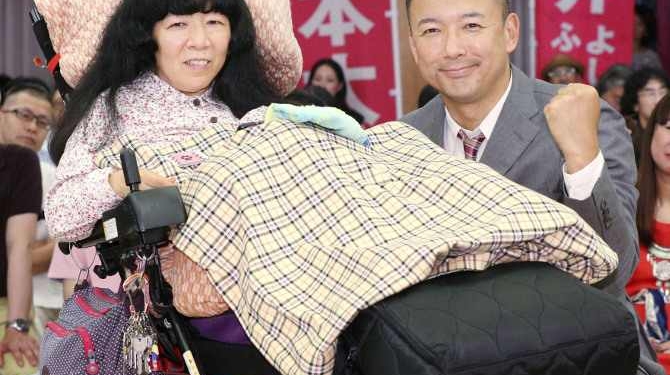
By Madeleine Keck | Global Citizen
Two politicians living with disabilities were sworn into Japan’s parliament this week, which activists are celebrating as “unprecedented” progress for disability representation and rights in the country.
The lawmakers — both members of Japan’s new Reiwa Shinsengumi political party — were elected to the upper house. Yasuhiko Funago lives with Amyotrophic Lateral Sclerosis, a progressive neurological disease that causes a continuous loss of muscle control. Eiko Kimura has cerebral palsy, a congenital disorder which can affect movement and muscle tone.
“I look frail, but I've got strong guts,” Funago stated in a note read out loud by his caregiver, according to the Japan Times.
“I am full of emotions that this moment has arrived, it has been a matter of life and death for me,” he said, before announcing he would work to promote acceptance, support disability-inclusive infrastructure, and help integrate individuals living with disabilities into society. “I don't want other disabled people to suffer like me.”
Reiwa Shinsengumi makes splash in Japanese election debut, giving voice to people with disabilities https://t.co/fK5FKSZxcb
— The Japan Times (@japantimes) July 22, 2019
VOX POPULI: Update overdue for Diet building to accommodate everyone’s needs:The Asahi Shimbun:The Asahi Shimbun https://t.co/BuNMcTfag1
— Asahi Shimbun AJW (@AJWasahi) July 23, 2019
Michael Peckitt — a lecturer at Osaka University and expert on disability studies — told the Agence France Presse that the election of two people with disabilities is a monumental step forward for the country.
“Disabled people winning elections and becoming elected officials in Japan is very important as a symbol of a possible change in attitudes towards the disabled in Japan,” he stated. “Japan as a country is not necessarily much worse than other countries overall when it comes to access, but sometimes cultural attitudes can appear to be different and seemingly more negative.”
Japan has historically denied rights to Japanese citizens living with disabilities
Between the late 1940s and 1996, the government forcibly sterilized citizens with certain mental illness or disabilities under the so-called Eugenic Protection Law. The policy, lawmakers said, was aimed at “preventing the birth of poor-quality descendants.” The law deprived citizens of their reproductive and health rights. Despite being overturned over 20 years ago, some of the social attitudes behind the law still remain in Japanese society.
In 2016, a person who held these lingering views attacked people at a care facility for people with disabilities, stabbing and killing 19 people. However, in recent years, Japan has made concerted efforts to improve the lives of its citizens with disabilities.
Mass stabbing at a center for the disabled shocks Japan. https://t.co/VXPUiPiCUR pic.twitter.com/FrhyqqEEyx
— New York Times World (@nytimesworld) July 26, 2016





![Everything You Ever Wanted to Know About 9/11 Conspiracy Theory in Under 5 Minutes [VIDEO] | by James Corbett](https://consciouslifenews.com/wp-content/uploads/2018/09/911-a-conspiracy-theory-350x250.jpg)









